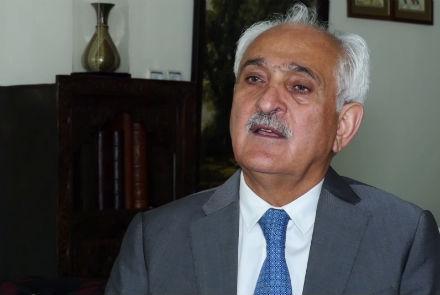Former head of the National Directorate of Security, Rahmatulalh Nabil, and former head of the National Security Council, Rangin Dadfar Spanta, on Saturday criticized security agencies for their “security lapses and intelligence failures” in preventing deadly attacks on public and military facilities such as Friday’s attack on the Afghan National Army 209 Shaheen Corps Headquarters in Balkh.
As many as 135 soldiers were killed in this attack.
The officials said changes should immediately be made in the leadership structure of security agencies.
“Unnecessary casualties are rooted in poor management and it is not acceptable. The people who are involved in many coups in the past are appointed at in the leadership ranks of security and defense agencies for two reasons: first because of ethnic issues and second because of ideology trends.
Therefore, they are not loyal to the people and to the Afghan soil. They are only loyal to the people who have appointed them because of ethnic and ideology issues,” the former National Security Advisor Rangin Dadfar Spanta said.
“Contradictory messages are being sent from the capital to provinces from time to time because of political disagreements in the central government. It has its effects. And secondly, interventions in security and defense issues from tribal, geographical and political points of view and creating different decision making layers is a reason behind poor management in security departments,” said Rahmatullah Nabi, the former head of the National Directorate of Security.
A number of former officials accused government of hiding the facts about the attack on the Afghan National Army’s 209 Shaheen Corps Headquarters in Balkh province and the attack on Sardar Mohammad Daud Military hospital in Kabul. They also said they are concerned about Taliban’s infiltration among security forces.
“The northern part of the country is a serious target for Taliban and government, along with NATO forces, should launch precautionary operations,” General Atiqullah Baryalai, the former deputy minister of defense ministry said.
“There are people, there are soldiers, there is a headquarters and they know about the facts. When they hide the casualty numbers, it puts a negative effect on soldiers, because they think government is lying,” Atiqullah Amarkhil, a former military officer said.
Members of the public have also blasted government for hiding the facts about the number of deaths.
“Sons of deputy ministers, sons of ministers and officials do not take arms and do not fight the enemy,” Aryan, a Mazar resident said.
“The officials’ sons and families do not die in these attacks,” said Bashir Ahmad, a resident of Kabul city.
“The sons of poor people are killed and the officials do not care about them,” Sayed Navid, another resident of Kabul city said.
Ministry of Defense (MoD) however has said in operations launched by security forces last year, more than 400 terrorist commanders were killed and security forces notched up good achievements.
“The enemy has been defeated and has failed to reach their goals. The security forces were successful in doing their job,” MoD spokesman, Dawlat Waziri said.
Before this, the Special Inspector General for Afghanistan Reconstruction (SIGAR) released a report on security forces’ casualties in the past year.
According to SIGAR, from January 2016 to November 2016 more than 6,700 soldiers were killed in different incidents and more than 11,000 others were wounded.


